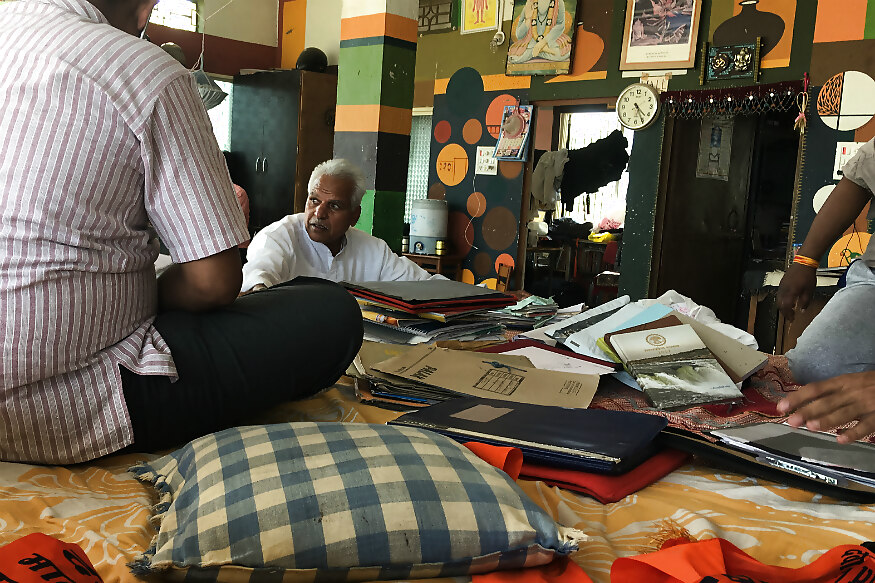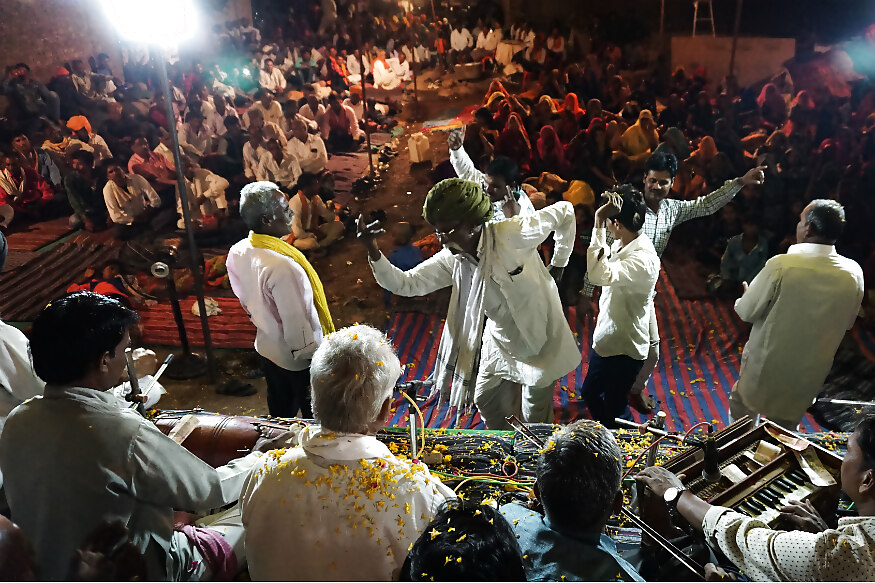
views
Many artists over the last 100 years have traced the origins of their careers, and some of their greater works, back to an inspired moment.
Something went off in Murakami’s head while he was watching a baseball game, ‘when the bat met the ball [the crack of the shot] resounded throughout Jingu Stadium. Scattered applause rose around me. In that instant, for no reason and on no grounds whatsoever, the thought suddenly struck me: I think I can write a novel.’
Nabokov described it as a ‘throb’. He experienced one when he read a ‘newspaper story about an ape in the Jardin des Plantes, who, after months of coaxing by a scientist, produced the first drawing ever charcoaled by an animal: this sketch showed the bars of the poor creature's cage.’ That’s when Lolita was conceived.
Marcel Duchamp had a moment in which he realised that the painting was dead. He declared that an upturned urinal was art. And art never remained the same.
For Prahlad Tipaniya, that moment happened 41 years ago. He was a government school teacher in Gaurkhedi village in Sehore, MP, giving lessons on elementary science and mathematics. He hadn’t read Kabir nor had he ever sung.
“It was a full moon night in Gaurkhedi. I hadn’t heard a Tamboor till then. A great saintly figure, Bhimpuri Maharaj was going through villages singing Kabir bhajans. That night, he decided to spend in our village and sing a doha of Kabir," Tipaniya says.
The words touched him deeply. That night he decided to pick up the Tamboor.
The doha was -
“Ruda ko phuul thane laage suhavno
sir saath mat lije
Osar khet mat bije"
“Kabir tells us that the manner in which a bird tries its best to break free a fruit on Semal tree but ends up dropping it, in the same way it is futile to plant a seed in barren land, because it will be a fruitless task... Similarly, we should prepare the ground before we think of reaping a harvest," says Tipaniya at Kabir ashram he has founded in Lunyakhedi village, in the little time he has to spare between his election campaigns.
“Ittefaaq se hum semal ke ped ke paas hi the. Ye doha sunke hamare man mein aaya ki ye gaana nahi ye to ghatna ghat rahi hai aur pratyaksh hum ise dekh rahe hain. Hume laga ki santo ki jo vaani hai, wo kewal gaana nahi hai. Wo aapke aur hamare, sabke jeevan ka ek darshan hai. Uske baad fir ek khoj shuru hoti hai."
“Us raat ke baad thoda bajana bhi seekh gaye. Aur kyunki hum shikshak the to thoda bohot samman bhi tha. Bhajan mein jaane lage aur log bulane lage. Fir gaadi chali to aisi chali ki desh aur duniya mein gaane lage."
Tipaniya is the most renowned modern day Kabir singer. Over the last four decades, not only has he kept alive 600-year-old tradition of singing Kabir to the masses, he has also built a fan base of Malwi Lok Sangeet in the West. In the course of which he has won many awards, including Sangeet Natak Academy award and the Padma Shri. And now at 65, he is fighting for a seat in Lok Sabha.
But having made his political debut at a not-so-young age, Tipaniya seems slightly uneasy every now and then. “Thoda typical maamla hai," he says opening up about his candidature, as he welcomes us into his car full of Congress workers.
A minute into the drive, Tipaniya gets a call from someone claiming to be a BJP worker who wants to switch over to the Congress. Tipaniya talks to him very warmly but relaxes after being told that this could be a trick by the opposition party to plant a mole in his camp.
Not a minute passes before he gets another call. This time it’s a Congress worker complaining of party factionalism. Tipaniya comes up with a plan. “Could we maybe plant our trusted guys within each faction to find who’s working against the party’s interests?" he asks a party worker in the car, but relaxes back in his front seat on being told that his plan is impractical.
At about 3 in the afternoon, we reach the office of a local Congress leader. Tipaniya is first rushed into a quiet room to record a radio ad for the party.
“Akhil bhartiya Congress committee ke adhyaksh, mananiya, shri Rahul Gandhi je ne, NYAY, ek badi yojana ki ghoshna ki hai, jiske tahat ati gareeb paanch karod paivaar ko…congress ko vote dein, rahul ji ko vote dein, haath ke panje ka button dabayein. Jai Hind."
The local leader talks business. “The first thing you need to do is to file your nomination. Get the paperwork done at the earliest. Then we will plan your campaign route. At your nomination we will need to show support with hundreds of cars." Tipaniya listens quietly, noting everything down.
An hour-and-a-half later we are sitting at his ashram in Lunyakheda. A trunk full of old documents is brought out and his whole family is running around looking for papers that nobody remembers whereabouts of.

Having performed in towns and villages for over last four decades, Tipaniya is a household name in Madhya Pradesh. More so in Dewas where he lives and hosts an annual Kabir festival, and from where he’s fighting election on a Congress ticket.
In his campaign visits, Tipaniya needs no introduction. Public response to him is immediate and warm. Youngsters line up for selfies as soon as they spot him.
This prompts us to ask, is he using Kabir to win the election?
“No that’s not the way I see it because my identity is Kabir. At one point Kabir says:
Jo kachu kiya so tum kiya (Whatever I did was done by you)
Main kiya kachu nahi (I did nothing)
Kaha kabahu jo main kiya (If I ever claimed credit for my deeds)
Tum hi the mujh mahi (It was because you were residing in me)
That spirit of Kabir is in everybody. Those who decided to pick me for this job, a Kabir resides in them too. Everyone has their own journey. I will tread my own path. I feel that if one wants to help people they can do so through politics also."
Has his life changed after getting a Congress ticket?
“Yes I may not be getting as much time to go to bhajans for the past one-and-a-half months. But that doesn’t mean I’ll stop singing. My win or loss is in destiny’s hands, though I’ll win for sure… I’ll make a point of singing in Parliament.
As Kabir has said in one doha
Sumiran ki sudhi yon karo
Jyon gaagar panihaar
Bolat dolat surati main
Kahe Kabir vichaar
Remember his name just like
The pitcher full of water
Is balanced on the head by the woman who also saunters and talks"
It’s hard to pin down an interviewee who decides to respond mostly in verse. We decide to continue our conversation in his car as Tipaniya resumes his campaigning. First stop is a wedding.
We reach the venue after half-an-hour. Tipaniya walks into the tent and people come from all over to touch his feet, as a mark of respect. Photographers turn around towards him. The bride and groom walk down to seek his blessings.
“I have done all the basic survey. All the depressed communities are with you. It’s a fight of 85% vs 15% [depressed sections vs upper castes] and you are placed quite comfortably. All you need to do is get a slice of upper caste votes," a village sarpanch tells Tipaniya who’s silently making mental notes.
Having visited all sections of the venue, Tipaniya bids farewell to the hosts and we’re back in the car. “It’s an 85% vs 15% fight. All we need to do is get a slice of upper caste votes," Tipaniya tells his party workers with authority.
Soon we are back on the main road, in the middle of which, out of nowhere, a man waves our car to stop. We do. A drunk man, having learnt of Tipaniya’s visit, has decided to garland Tipaniya and won’t budge till he’s allowed to. Tipaniya obliges and as a bonus allows him to click a selfie.
Do you think that the audience for Kabir has increased over the years, we ask him.
“I think that the interest in him is increasing. Back in the day, when I used to sing, there were barely 2-4 troupes in the whole of Malwa (Western-Central Indian region, just North of Vindhyas). Today, there are thousands of them interpreting Kabir and other saints in their own ways. So, the interest in him has increased certainly," he says.
And what explains this growing interest in Kabir?
“People are growing away from each other. Cruder interpretations of religion, phoney gurus, and maybe intrusion of capital in everything…these things are further expanding the rifts. So the younger, more concerned generation understands this. They are the ones who listen to Kabir the most. Fifty years ago, there were only old people in the audience. That’s the difference."
It is around 10 in the night when we reach Balai (Scheduled Caste) dominated village of Aala Umrod. In the SC reserved seat of Dewas, Balais have an influential vote base. This is why both Congress and BJP have fielded Balai candidates.
But in fielding Tipaniya, Congress scores over BJP in two ways. First, BJP’s candidate, former civil court judge Mahendra Singh Solanki, pales in popularity to Tipaniya. Second, Congress has been able to exploit anger among the SC community, especially the ‘Balais’ to its advantage. In the recently held polls, Congress made advances by bagging four of the eight assembly seats, all of which BJP had won in 2013 assembly polls.
“Tipaniyaji you don’t have to campaign anywhere. God himself is on your side," says the emcee on the stage welcoming Prahlad Tipaniya. “Tipaniyaji is fighting elections and today he has come here to sing for us," he tells hundreds of people sitting on the floor.
It has been a really long day. The night time temperature is still uncomfortably high. One expects Tipaniya to hum a tune and leave. What one doesn’t expect is him singing three songs, followed by, on public demand, a fourth, with such love as if this were his first big performance. What one also doesn’t expect is to see men and women get up and dance with such freedom and joy. Bound only by their limited, awkward movements.

It’s a new day and we’re back in Tipaniya’s car. Mornings are quite busy. The phones keep ringing. It feels strange to be sitting beside the person who is the voice of all the ringtones around. His Kabir bhajan ‘zara halke gaadi haanko’, the most popular Tipaniya hit till date, is also the ringtone of his own phone.
At 9:30 we reach village Badan. The mourners welcome Tipaniya as he moves around, himself serving food to some of them. At 10:30, we reach village Sikhedi where Tipaniya has come to attend a wedding. From there, we attend a wedding in an adjoining village. By noon, Tipaniya has been to, quite literally, two weddings and a funeral.
A question that one itches to ask, having seen Tipaniya campaign extensively for a Lok Sabha seat, is whether by trying to fit in the Indian Parliament, he ends up standing paradoxically against his own nirgun-bhajan-singing-self.
We ask Shabnam Virmani, who captured in great nuance Tipaniya’s earlier journey of becoming a priest, and having become one, losing his priesthood soon afterwards.
“I feel that Kabir's brand of spirituality is powerful because it doesn't force us to renounce the world. Kabir himself lived through the rough and tumble of daily life," Virmani says.
“I see an experimental streak in him. He tries to enter terrains or spaces which are new to him. If he were purely ambitious, he wouldn't have critiqued the panth, which caused him to be thrown out," she adds.
Linda Hess, senior lecturer at the department of religious studies, Stanford University, is a Kabir scholar who has also closely observed the journey of Prahlad Tipaniya for the past several years.
She feels that while it may be difficult for Tipaniya to make the transition from a bhajan singer to a full time parliamentarian, he is in all likelihood the best man for the job.
“For the last 17 years Prahlad ji has been my dear and deeply respected friend, an important teacher to me, and my rakhi-bhai. I was surprised when I heard that he was becoming a candidate for Parliament. He has always spoken for the absolute equality of all people and against communalism, against caste oppression and narrow-minded religious sectarianism."
She adds, “The world of Kabir bhajans — pervaded by deep spiritual insight, fearless social commentary, and beautiful music — is very different from the world of politics. It will be challenging to make that transition, but I expect that he will be able to do it, and that waves of inspiration from Kabir can bring valuable energy to the halls of Parliament."
One of India’s greatest singers, Kumar Gandharva, also owed a lot to Dewas where he spent several years recovering from tuberculosis, and where he rediscovered his art through Kabir and Lok Sangeet. One of the Kabir bhajans he immortalised was ‘Hans Akela’. The 15th century poet couldn’t have written a better tribute to his most famous living disciple.
Ud Jayega hans akela
Jag darshan ka mela...
Ud jayega Hans Akela
Jaise paat gire taruvar ke
Milna bahut duhela
Naa jaanu kidhar girega
Lageya pawan ka rela
The Swan Will Fly Away Alone,
Just as the Leaf Falls from a Tree
And disappears
Who Knows Where it Will Fall
Once it is Struck with a Gust Of Wind



















Comments
0 comment